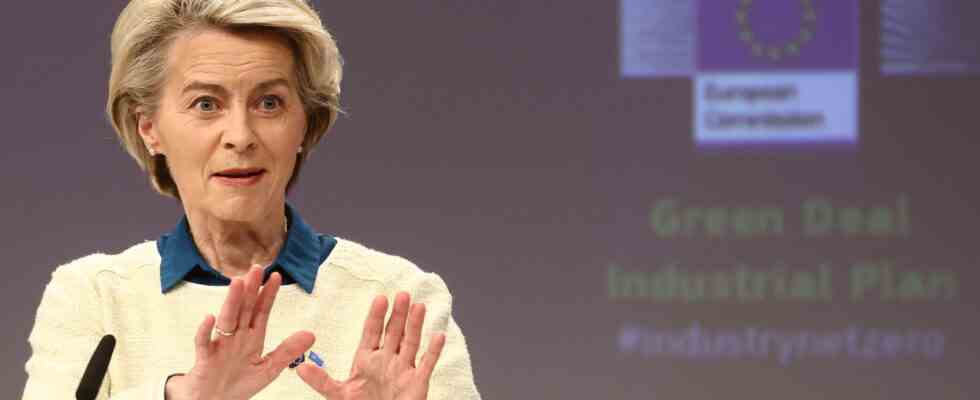comment
Status: 02/01/2023 18:03
With her plans for a green industry, EU Commission President von der Leyen wants to keep up with the USA and China. The EU should not make new common debts for this. That’s risky.
So this is supposed to be Europe’s answer to the almost $400 billion subsidy program of the Biden administration in the USA. The answer to the Chinese government’s massive state aid for local companies. The response to government support, such as that provided in Canada or Japan – to protect the economy in times of high inflation. But above all: to convert them – towards sustainability, towards climate protection.
That’s what Europe wants too: No more CO2 emissions by 2050 and big steps towards carbon dioxide reduction by the end of this decade. A huge claim, but the steps taken so far have been far too small and are being slowed down by the Ukraine war, currency devaluation and poor prospects.
To put it plainly: What the EU Commission and its President Ursula von der Leyen presented in Brussels today will hardly change anything. It is, as a member of the European Parliament from the CSU put it in a nutshell: not much more than old wine in new bottles.
Keep up internationally – by shifting?
The President of the Commission – verbose as always – emphasizes how important it is to quickly convert Europe’s economy and society towards zero emissions. It confirms the need not to fall behind internationally and to be better than the other economically relevant blocks on this globe. But then she says: Existing money from EU pots must now be invested more quickly – and means above all previously unused three-digit billions from the Corona rescue fund. She wants to redeploy the funds.
Why this should bring additional investments, new impetus and even give Europe a competitive advantage internationally – that remains her secret. Because the money was actually intended to heal the economic injuries caused by Corona in the EU and to keep the member states together despite their different financial strength.
Intra-European subsidy race
Apparently, such intentions no longer play a role, on the contrary: the Commission also wants to relax European state aid law. This is actually essential to ensure that the internal market works and does not slip into difficulties. The consequence: economically strong states like Germany and France can cheerfully support their own industries, while the smaller ones fall by the wayside in such an intra-European subsidy race. Unlikely to go well.
And then? Then the weak have to be supported again with huge payments from Brussels so that the EU doesn’t tear apart. How to prevent this and still survive in international competition in unprecedented times of global crisis, the EU Commission has cheated its way around this question with these plans. Otherwise it would at least have had to bring new common European debts into play as a possible means of choice. The fact that she didn’t do it is – to put it mildly – not without risk.
Editorial note
Comments always reflect the opinion of the respective author and not that of the editors.
Opinion: Old wine in new bottles – Europe’s response to US subsidies
Holger Beckmann, ARD Brussels, February 1, 2023 4:58 p.m

